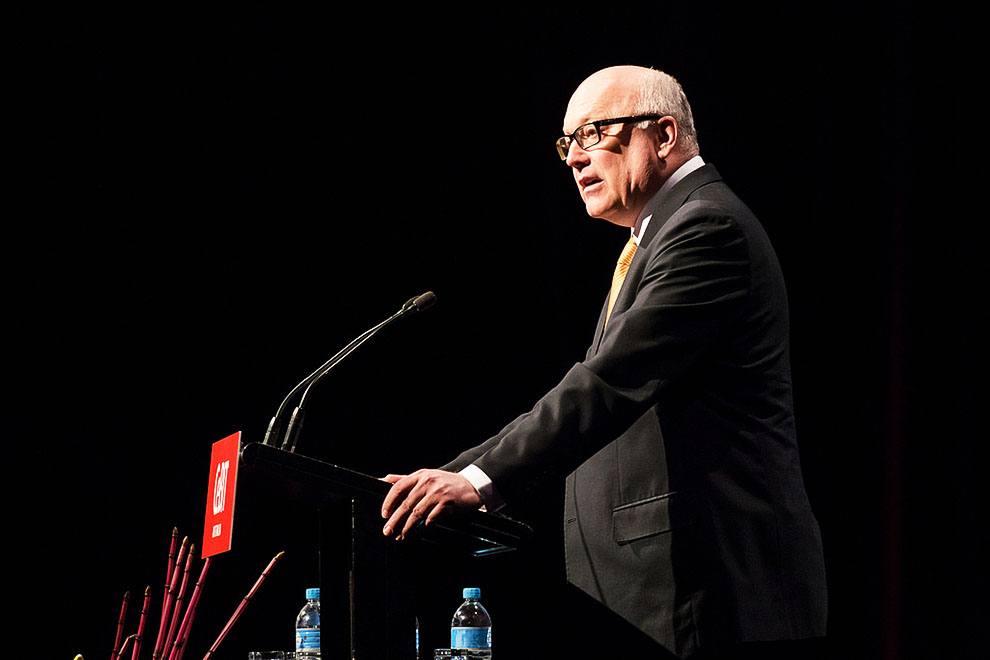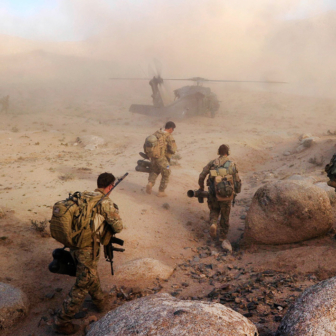Attorney-general George Brandis’s announcement last week that a fifth set of counter-terrorism laws will be introduced into parliament next month came as no surprise. At the Regional Summit to Counter Violent Extremism in June he signalled that a new tranche of legislation would “take into account lessons learned from recent legislative amendments and counter-terrorism operations, while respecting individual rights, such as freedom of expression, and the rule of law.” The government spent the winter discussing what those reforms might look like with the security and intelligence agencies and with the states and territories.
Very few details have so far been released. From what we know, though, it looks like the bill will simply tinker around the edges of existing laws. Among other, as-yet-unannounced measures, we do know that the government plans to amend control orders and create a new offence of inciting genocide.
If the laws pass, this will be the second time in a year that the control order regime has been amended. Last November, the Counter-Terrorism Legislation Amendment (Foreign Fighters) Act extended the life of the control order regime and expanded the grounds on which an order may be issued. Questioned in the Senate last week, Brandis foreshadowed three further changes to control orders, the most controversial of which would lower from sixteen to fourteen the age at which a person can be subject to a control order.
Under existing laws, a control order on a sixteen- to eighteen-year-old can’t last for more than three months. Brandis has suggested that control orders issued to under-sixteens will be subject to adequate safeguards, but he hasn’t said what these will be. At the very minimum, they should incorporate the existing safeguards given to sixteen- to eighteen-year-olds.
The attorney-general also says that the new legislation will enable better monitoring of individuals subject to control orders by relaxing controls over searches, telecommunications interception and surveillance devices, and will give greater protection to sensitive information in control order proceedings. These proposals won’t only further restrict the liberty of those subject to a control order; they will also make it more difficult for the subject of the order to uncover the grounds on which the control order was imposed. The legislation will, in effect, make it harder for people to challenge the intelligence case against them.
The potentially negative effects of these measures would be offset by implementing recommendations of the Review of Counter-Terrorism Legislation carried out by the Council of Australian Governments, or COAG, in 2012. Among other safeguards, the review recommended that Australia introduce a Special Advocate scheme like that which operates in closed material proceedings in Britain.
These additional safeguards are certainly to be welcomed. But the timing of the planned amendments to control orders is at odds with the existing review provisions for the anti-terrorism regime. When the parliament enacted the foreign fighters legislation last November, it committed to reviews by the Parliamentary Joint Committee on Intelligence and Security and the Independent National Security Legislation Monitor before the laws expire in September 2017.
The Independent National Security Legislation Monitor’s review, under the new Monitor, Roger Gyles QC, is already under way; its focus is on the adequacy of the safeguards in the control order legislation and the question of whether COAG’s recommendations should be adopted. Gyles (whose office is already overstretched) is required to complete his report by 7 September 2017, long after this latest legislation is likely to have been enacted. By introducing amendments to the control order regime now, the government is denying parliament the opportunity to be informed by an independent review before it legislates. Not for the first time, the recommendations of the Independent National Security Legislation Monitor will be sidelined, raising questions yet again about the role of the office.
Even though the government began considering its fifth tranche of counter-terrorism legislation in June this year, some of the proposed amendments to the control order regime can perhaps best be viewed in light of the ages of those involved in recent terrorist attacks and foiled plots in Australia. The fatal shooting of Curtis Cheng last week by fifteen-year-old Farhad Khalil Mohammad Jabar and the revelations that a child as young as twelve is being monitored by the Australian Federal Police might suggest that some action needs to be taken. But it is not clear that lowering the age at which control orders can be imposed is the best option.
In Britain there is nothing to prevent a Terrorism Prevention and Investigation Measure – the control order equivalent – from being issued to a teenager. In practice, though, alternative methods have been used to deal with young people suspected of engaging in terrorist activity. For example, a girl who was fifteen when she committed the offence of possessing information likely to be of use to a person preparing a terrorist act was spared a prison sentence last week. Instead, she was given a twelve-month referral order with a youth offending team. These alternative approaches are not always realistic, but children who have committed serious terrorism offences are at least dealt with in the court, with all the fair trial protections of the ordinary criminal law, and not by means of an executive order. The fourteen-year-old British boy who incited the Anzac Day terrorism plot in Australia was recently sentenced to life in prison.
The other proposal signalled by Brandis – a new offence of inciting genocide – appears odd, not because conduct of this kind is not worthy of being treated as an offence but because, as the former Independent National Security Legislation Monitor, Bret Walker SC, recently pointed out, “genocide as a crime against humanity already exists and incitement to crimes already exists.” When asked why he thought the government was introducing such a measure, Walker responded that it “accords with the great Australian habit of seeing a problem and passing a law about it.”
NSW premier Mike Baird certainly appears to share that tendency. He has announced that the NSW government will be seeking its own amendment to existing laws governing how long a terrorist suspect can be detained for questioning by the police. At present, the state’s police aren’t authorised to detain a terrorist suspect for more than twenty-four hours without laying charges. In reality, though, a person can be detained for much longer. For instance, certain periods, known as “dead time,” aren’t counted towards the twenty-four hours. Dead time occurs when the suspect is resting or receiving medical attention, for example, and can’t be questioned. On top of the twenty-four hours plus dead time, a magistrate may also suspend questioning for up to seven days, if it is reasonable to do so, during which the suspect would remain in detention.
The effect of these provisions is that a terrorist suspect may be detained for more than eight days prior to charges being laid, but can only be questioned for twenty-four hours of that time. Baird has stated his intention to increase the maximum pre-charge detention period from eight to twenty-eight days. If the other Australian states and territories don’t agree, his government will implement these measures on its own.
Troy Grant, the NSW deputy premier and police minister, says that twenty-eight days is an appropriate time-frame for pre-charge detention and is consistent with other jurisdictions. But the other Australian states and territories don’t allow detention for such significant periods of time – and nor, it seems, do they intend to. Nor is the proposal consistent with international comparisons. The British parliament did increase the maximum period of pre-charge detention to twenty-eight days in 2006, following the London bombings, but this was reduced to fourteen days in 2011 in an attempt to liberalise the counter-terrorism laws.
While the British provision was initially enacted for similar reasons to those Grant has given – that the existing period of pre-charge detention was inadequate “to gather very difficult evidence, to be able to bring that before a court to proceed with evidentiary charges or other further action” – during those five years only six terrorist suspects were detained for the maximum period. This might show remarkable restraint on the part of the police, or it might suggest that the measure was not entirely necessary in the first place. No one is suggesting that the maximum period of pre-charge detention should be increased again, despite Britain’s threat level from international terrorism sitting at “severe” and despite a number of terrorist attacks and foiled plots in the past five years.
New South Wales hasn’t set its sights only on pre-charge detention. The Baird government has also amended legislation by regulation to allow ASIO and the state Crime Commission to access photographs without a warrant. As well as driver’s licence photographs, the two agencies will also be able to collect photos used on the NSW Photo Card and a variety of trade licences, such as those issued to real estate agents, motor dealers and strata managers. Victoria has also recently announced new measures to aid police investigations into terrorist activity.
Recent plots and attacks within Australia and the ongoing crisis in Syria and Iraq have fuelled the drive for new laws. But new offences and greater police investigative powers won’t eradicate the terrorist threat in Australia. Nor will the government’s plan to grant itself the power to strip Australian citizenship from dual citizens suspected of engaging in terrorist activity. What these measures are likely to do is make greater inroads into the freedoms enjoyed by all Australians, while disproportionately affecting Muslim communities. •




